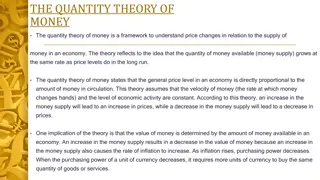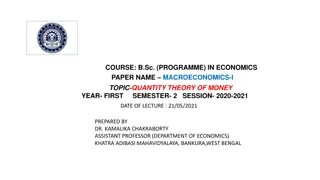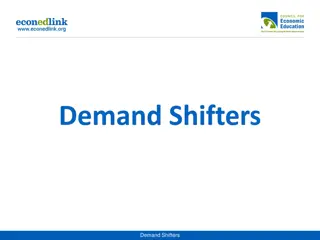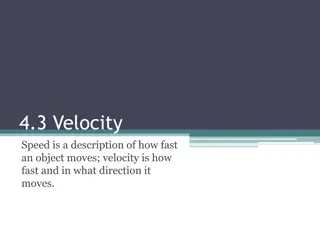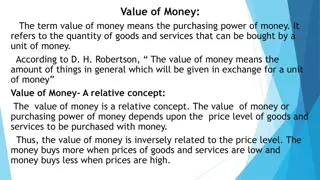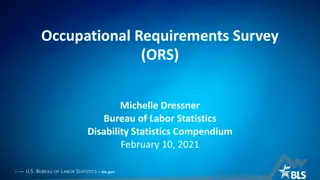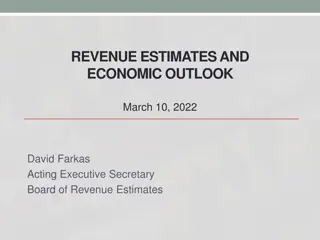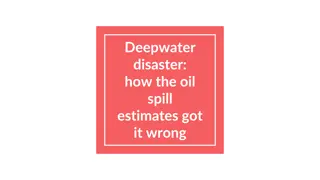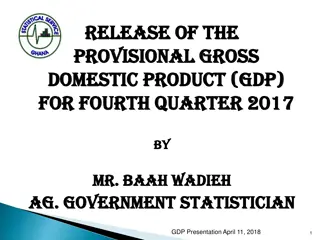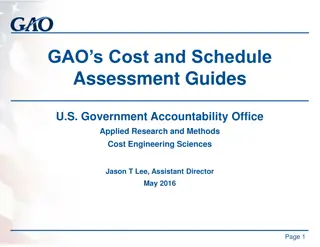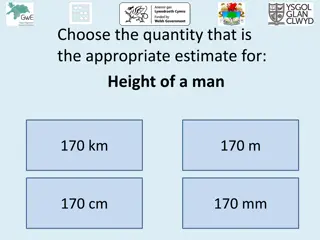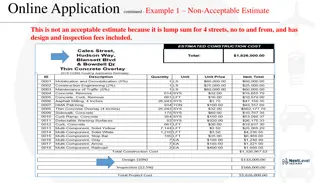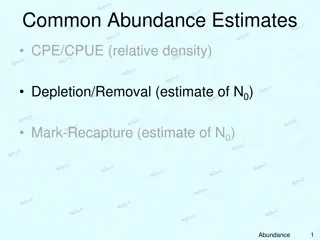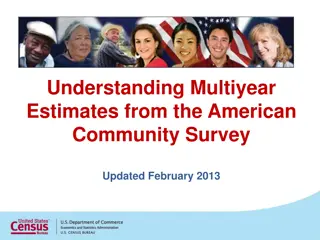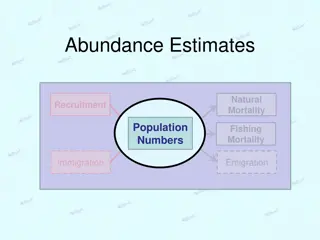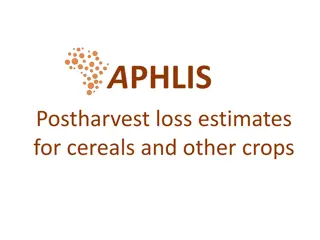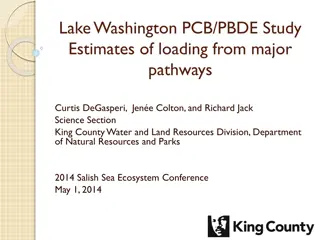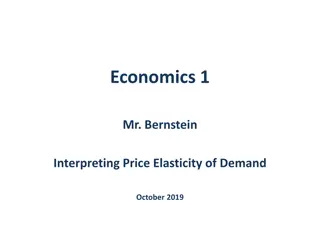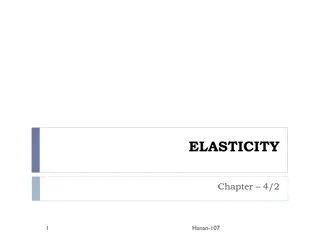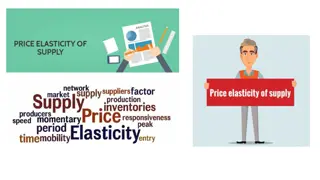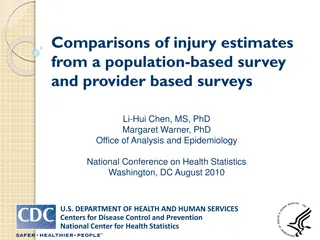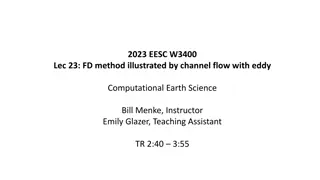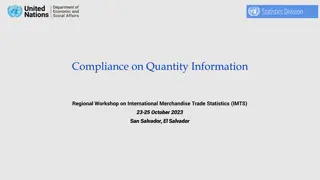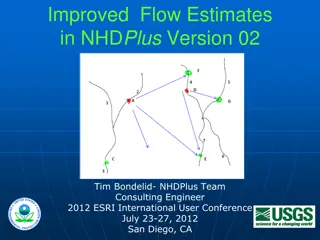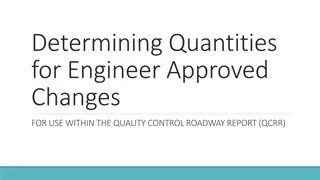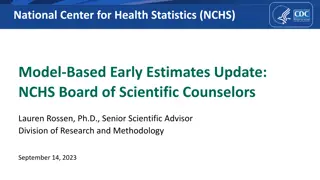Exploring Mathematics: Definitions, Principles, and Applications
Mathematics is the science of number, space, quantity, and measurement, providing a logical study of shape, arrangement, and quantity. This lesson delves into the meaning and definitions of mathematics, emphasizing its systematic and exact nature. It covers quantitative facts, spatial relations, and
1 views • 32 slides
DRRS Design to Meet HB1500 Intent
The primary goal of the DRRS in line with HB1500 is to determine the quantity of services required based on historical variations in generation availability to uphold targeted reliability standards. The system must be able to shed firm load during extreme events, particularly severe winter storms, a
0 views • 6 slides
INVENTORY MANAGEMENT.
Managing inventory under ISO 15189 guidelines involves Quantity, Quality, and Process management. Key aspects include demand forecasting, inventory movement control, consumption planning, and ensuring fitness for purpose. Quantity management aims to balance demand and supply, manage supply economics
5 views • 13 slides
Optimizing Minimum Order Quantity Strategies for Supply Chain Success
Welcome to our presentation on \"Minimum Order Quantity (MOQ): Optimizing Supply Chain Efficiency.\" In today's dynamic business environment, managing inventory effectively is crucial for businesses to minimize costs and maximize profitability. One key aspect of inventory management is determining t
7 views • 7 slides
Understanding the Quantity Theory of Money
The quantity theory of money posits a direct relationship between the supply of money in an economy and price levels, assuming a constant velocity of money and economic activity. Increases in the money supply lead to price inflation, devaluing currency and decreasing purchasing power. Two main versi
2 views • 6 slides
Understanding Scientific Purchasing Principles for Effective Procurement
Scientific Purchasing, also known as Procurement, involves buying materials efficiently by focusing on quality, quantity, price, place, and time considerations. This process ensures optimal stocking levels, timely procurement, and cost-effective sourcing to meet organizational needs. By adhering to
1 views • 13 slides
Understanding the Quantity Theory of Money: Fisher vs. Cambridge Perspectives
The Quantity Theory of Money explains the relationship between money supply and the general price level in an economy. Fisher's Equation of Exchange and the Cambridge Equation offer different perspectives on this theory, focusing on money supply vs. demand for money, different definitions of money,
0 views • 7 slides
Understanding Demand Shifters in Economics
Explore the concept of demand shifters in economics, including the factors that influence changes in demand such as consumer income, number of consumers, prices of substitute and complimentary goods, consumer preferences, and expectations. Learn how changes in these factors impact the quantity deman
0 views • 14 slides
Understanding Velocity vs. Speed in Physics
Velocity and speed are fundamental concepts in physics that describe how fast an object is moving and in what direction. While speed is a scalar quantity representing the rate of motion, velocity is a vector quantity that includes both speed and direction. Constant velocity implies steady speed and
0 views • 8 slides
Exploring the Impact of Salt Quantity on Saltwater Circuit Current
A saltwater circuit utilizes saltwater as a key element for conducting electricity. This unique circuit involves the dissolution of salt into sodium and chloride ions, which, when exposed to an electric voltage, allows for the flow of electricity. The quantity of salt present in the circuit directly
0 views • 9 slides
Understanding the Law of Demand in Economics
The Law of Demand, explained by Dr. Pooja Singh, Assistant Professor at Chhatrapati Shahu Ji Maharaj University, Kanpur, outlines the inverse relationship between the price of a commodity and the quantity demanded. This fundamental economic principle states that as the price of a product decreases,
0 views • 9 slides
Understanding the Value of Money and Standards
The value of money refers to its purchasing power, which is influenced by the price level of goods and services. Different standards, such as wholesale, retail, and labor, help measure the value of money. Money can have internal and external value, affecting domestic and foreign transactions. The Qu
0 views • 62 slides
Overview of Occupational Requirements Survey (ORS) and 2020 Estimates
The Occupational Requirements Survey (ORS) by the Bureau of Labor Statistics provides detailed insights into the occupational demands of various job roles, including physical, cognitive, and environmental requirements. The survey encompasses data on speaking requirements, weight lifting capabilities
0 views • 22 slides
Understanding Supply and Demand in Economics
Supply and demand are fundamental concepts in economics. Demand is the quantity of a good buyers are willing and able to purchase at various prices, while supply is the quantity of a good producers are willing to sell at different prices. Factors like income changes, taste preferences, and prices of
1 views • 13 slides
Maryland Revenue Estimates & Economic Outlook March 2022
The revenue estimates and economic outlook for Maryland in March 2022 show growth in income taxes, sales and use taxes, and other revenues. Detailed figures for fiscal years 2021-2023 indicate estimates and actual data for various tax types like individual and corporate income taxes. The changes in
0 views • 17 slides
Analyzing Deepwater Disaster: Inaccurate Oil Spill Estimates
Explore the Deepwater Horizon disaster, where oil spill estimates were inaccurate due to various factors such as convoluted discharges, technological limitations, and reluctance to share data. Consequences of underestimation and reasons behind flawed estimates are discussed, shedding light on the ch
0 views • 13 slides
Provisional Gross Domestic Product (GDP) Estimates Presentation April 11, 2018
The release provides provisional GDP estimates for the fourth quarter of 2017, along with revised estimates for the first three quarters of 2017 and annual estimates for 2016. The GDP measures the value of goods and services produced in the country. The estimation of GDP is done in stages, with prov
0 views • 33 slides
Guidelines for Acceptable Estimates in Online Applications
Examples of acceptable and non-acceptable estimates in online applications for infrastructure projects. Criteria include clear itemization, exclusion of unnecessary fees, proper documentation of road names, and accurate unit measurements to avoid common errors. These guidelines help ensure accuracy
0 views • 7 slides
GAO Cost and Schedule Assessment Guides: Enhancing Government Accountability
The Government Accountability Office (GAO) plays a crucial role in supporting Congress to fulfill its responsibilities by improving federal government performance and ensuring accountability. The GAO Cost Estimating and Assessment Guide outlines criteria for assessing cost estimates, and the Reliabl
0 views • 19 slides
Choose the Appropriate Quantity Estimates
This content presents a series of questions with images, asking you to choose the appropriate quantity estimate for various scenarios like height of a man, weight of a large dog, capacity of a car's fuel tank, floor area of a room, and more. Test your estimation skills in different measurement units
0 views • 20 slides
Best Practices for Contractors: Examples of Acceptable and Non-Acceptable Estimates and Bids
Explore examples of acceptable and non-acceptable estimates and bids for contractors in online applications. Learn why lump sum estimates, lack of detailed information, and incorrect unit bidding can impact the bidding process negatively. Discover how clarity, itemization, and adherence to bidding s
0 views • 13 slides
Fisheries Abundance Estimates and Depletion Methods
Explore common abundance estimation techniques like CPUE, mark-recapture, and depletion methods. Understand how to calculate relative density, depletion estimates, and cumulative catch. Discover the concepts of N0, Nt, Ct, and q in depletion estimates using regression models. Learn about the assumpt
0 views • 10 slides
Understanding Multiyear Estimates from the American Community Survey
This comprehensive guide delves into the concept of multiyear estimates from the American Community Survey (ACS). It explains what multiyear estimates are, when to use them, considerations to keep in mind, making comparisons with them, examples of their application, definitions of period and multiye
0 views • 35 slides
Understanding Abundance Estimates in Fisheries Management
Explore the concept of abundance estimates in fisheries management, including natural mortality, recruitment, population numbers, fishing mortality, immigration, and emigration. Learn about common abundance estimation methods like CPE/CPUE, depletion/removal estimates, and mark-recapture techniques.
0 views • 10 slides
Postharvest Loss Estimates for Cereals and Crops: A Practical Guide
Explore APHLIS website to access science-based estimates of postharvest losses for cereals and crops using an interactive calculator tool in Excel. Discover how to input location-specific data, select crop and climate zones, and obtain quality estimates for different harvest seasons. The APHLIS Calc
0 views • 38 slides
Lake Washington PCB/PBDE Study Estimates and Loading Pathways
This study presents estimates of loading of PCB/PBDE pollutants in Lake Washington from major pathways, including rivers, local drainages, and monitored tributaries. The data shows current PCB loading estimates to Lake Washington and its exits to Puget Sound, providing insights into sources and conc
0 views • 12 slides
Support Structure Fabrication Project Overview
An overview of a support structure fabrication project by Hanzel, focusing on procurement strategy, budgetary estimates, vendor quotes, and lead times for various components like yokes, loadpads, collars, master and false coils, aluminum shells, nitronic end plates, axial rods, and tension rods. The
0 views • 13 slides
Quantity Surveying for Concrete Works: Blinding and Foundation Estimates
This course covers quantity surveying techniques for blinding concrete under foundations and estimating concrete needed for various structural elements like foundations, columns, and walls. Dr. Ala'a Alshdiefat provides detailed calculations and examples for calculating blinding concrete and foundat
0 views • 25 slides
Understanding Price Elasticity of Demand in Economics
Price elasticity of demand is a crucial concept in economics, as it measures the responsiveness of quantity demanded to price changes. A higher elasticity value indicates a more significant impact of price changes on demand. The concept helps businesses understand how changes in pricing affect their
0 views • 8 slides
Understanding Elasticity in Economics
Elasticity in economics refers to the responsiveness of demand to price changes. A more elastic curve results in larger quantity changes for small price changes, while a less elastic curve requires larger price changes to affect quantity consumed. The elasticity of demand can be measured by calculat
1 views • 13 slides
Understanding Price Elasticity of Supply in Economics
Price elasticity of supply measures how much the quantity supplied responds to changes in price. It can be inelastic (quantity supplied responds slightly), elastic (quantity supplied responds substantially), or unit-elastic (price elasticity of supply equals 1). Various determinants like the passage
0 views • 16 slides
Understanding Degrees of Elasticity of Demand
Elasticity of demand refers to the responsiveness of quantity demanded to changes in price. Perfectly elastic demand occurs when there is an infinite demand at a particular price and demand becomes zero with a slight rise in price. Conversely, perfectly inelastic demand occurs when there is no chang
0 views • 11 slides
A Comparison of Injury Estimates from Population-Based and Provider-Based Surveys
This study compares injury estimates obtained from a population-based health survey with estimates from two provider-based surveys. Data from the National Health Interview Survey (NHIS), National Hospital Ambulatory Medical Care Survey (NHAMCS-ED), and National Hospital Discharge Survey (NHDS) are a
0 views • 18 slides
Understanding Conservation of a Quantity in Fluid Motion
Today's lecture in Computational Earth Science delved into the Navier-Stokes Equation and the conservation of momentum in moving fluids. The discussion focused on the tricks involved in solving for pressure, dealing with repeating boundaries, and tracking eddies in channel flow. Through detailed ill
0 views • 44 slides
International Merchandise Trade Statistics Workshop 2023 in San Salvador
Regional workshop on International Merchandise Trade Statistics (IMTS) will be held in San Salvador, El Salvador from October 23-25, 2023. The workshop will focus on compliance with quantity information, availability of net weight and quantity data, extreme values, data processing in COMTRADE and Co
0 views • 8 slides
Insights from India Maize Summit 2013: Market Trends and Production Estimates
Discover key highlights from the India Maize Summit 2013 in New Delhi, showcasing global maize market trends, production estimates, export destinations, challenges, and India's role in international trade. Explore data on maize production, trade, consumption, and stocks globally and in India, along
0 views • 13 slides
Enhanced Flow Estimates in NHDPlus Version 02 Presentation
Presentation by Tim Bondelid at the ESRI International User Conference discussing the Enhanced Runoff Method (EROM) in NHDPlus Version 02 for improved stream flow estimates. Highlights the importance of accurate flow estimates for various water-related goals and the methodology used to enhance flow
0 views • 18 slides
Understanding Confidence Intervals and Point Estimates in Statistics
Explore how confidence intervals are constructed around point estimates such as sample mean in statistics. Learn the significance of confidence levels and how to develop confidence intervals using practical examples. Follow step-by-step instructions to analyze data and interpret results for populati
0 views • 20 slides
Guidelines for Engineer Approved Quantity Changes in QCRR
Learn how to determine and enter Engineer Approved Quantity Areas or Tonnages in the Quality Control Roadway Report (QCRR) for adjustments to the plan quantity. Understand the process for entering values on the Pay Quantity Updates Tab, calculating changes for each pay item, and determining Engineer
0 views • 7 slides
Model-Based Early Estimates for Health Statistics Enhancement
The National Center for Health Statistics (NCHS) is working on improving the timeliness and granularity of data through model-based early estimates. Their goal is to enable data-driven actions, predict deaths, and report data accurately. The NCHS is focusing on enhancing their data systems and produ
0 views • 6 slides




